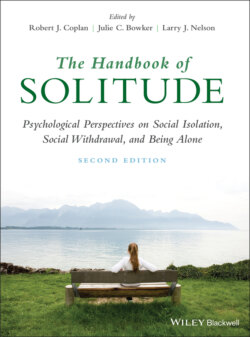Читать книгу The Handbook of Solitude - Группа авторов - Страница 59
5 The Origins of Beneficial Solitude: Psychoanalytic Perspectives
ОглавлениеEvangelia Galanaki
University of Athens, Greece
In the domain of psychoanalysis and in numerous psychoanalytic theories, solitude, as a state of being alone, has been described as a fundamental and potentially beneficial human experience and has been ascribed a variety of meanings (Buchholz, 1997; Modell, 1993; Storr, 1988; see also Coplan, Bowker, & Nelson, Chapter 1). However, there have been few psychoanalytically informed empirical studies on beneficial (or potentially beneficial) solitude as a personality enhancing and constructive experience of aloneness. In contrast, from the psychoanalytic standpoint, loneliness, as the painful experience of being alone, has been the topic of a few well‐known studies, published some decades ago (e.g., Fromm‐Reichmann, 1959; Klein, 1975), and more recently (e.g., Quinodoz, 1991/1993), by clinicians. Empirical investigations into the origins of beneficial solitude from various psychoanalytic perspectives, however, are appropriate and potentially useful, for the following three reasons: (i) psychoanalysis has placed much emphasis on the decisive role of early life experiences, therefore the origins of solitude are also of great importance; (ii) most psychoanalytic models focus on what is the essence of solitude, that is, on the complex relation between the inner/private and the outer/social realm of human experience; and (iii) psychoanalysis, as a psychotherapeutic method based on a two‐person relationship and aiming at uncovering the unconscious layers of personality, is expected to alleviate loneliness and promote beneficial aloneness.
In the chapter, several psychoanalytic views on the origins of beneficial solitude, its developmental course during the first years of life and its implications for later development will be discussed and evaluated, organized around three dimensions: the solitary self, the ability to be alone and the necessity of being alone, as well as the companionable nature of solitude. Finally, conclusions will be drawn and future directions will be described, concerning the paradox of solitude, which I argue is evident from the beginning of life.
